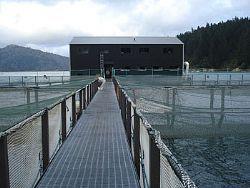OFFICIALLY opened by the Prime Minister on February 14th, New Zealand King Salmon Co’s new Clay Point fish farm in the Marlborough Sounds’ Tory Channel is expected to lift the company’s output by up to 2000 tons per year when fully operational. At the centre of the Clay Point farm is a custom-built $1.5 million barge built by Challenge Marine in Nelson which provides accommodation for up to five staff 24/7 (staff work seven days on, seven days off), as well as storage provision for eight days feed (dried pellet), energy generation, King Salmon’s aquaculture general manager Stewart Hawthorn says the company has operated barges over many years but had not invested in a new facility for quite some time. "Obviously we were able to draw on our experience with our existing facilities, and factor in the latest overseas fish farm practices. We involved staff who work on our other barges and senior managers, who also had barge experience, in the design process – then developed final plans with the builders. Everyone is very pleased with the final outcome." Establishing the Clay Point Farm, which is situated in an area that experiences strong tidal currents, has not been without its technology challenges. Having experienced a mooring failure on one of its other farms two years ago, Hawthorn says redesigned moorings were mandatory for Clay Point, and the company has installed data loggers to monitor the tension on the moorings. "We did consider GPS as an early warning system, but felt that it wouldn’t provide sufficient advance warning of a problem," he says. While the current logging system requires the manual downloading of data once a week, Hawthorn says the intention is eventually to go wireless with the monitoring. Clever ideas New Zealand King Salmon Co has utilised some clever ideas for increasing efficiency of the farm. One of the best examples of this involves feeding the fish, which are contained within giant nets suspended by a floating cage structure built in Blenheim by Cuddon Engineering. Traditionally, 25kg bags of fish feed were physically carried to each cage or a wheelie bin was employed. At Clay Point however, a special feeding system from AKVASmart in Norway has been installed. The feed is transferred directly from the barge to the support cages via black HDPE piping. Pellets are dropped into a central hopper and a Roots type blower sends it to the fish. Each support cage has a submerged TV camera linked back to the barge office where the operator can monitor the feed dispersal away from the elements. "Although it’s only a semi-automated process, it’s still a big step forward for the operators and requires very little maintenance," says Hawthorn. Another innovation at the farm is the barge’s built-in stability system. As fish feed is loaded or discharged from the barge, special manually-driven ballast tanks keep it on an even keel. Priority has also been given to energy usage. A main generator is required to power the feeding system, hot water and refrigeration; however at other times the generator remains switched off and any excess energy stored and used to power the lighting and ancillary equipment. "The inverter effectively halves the running time of the generator, which means less maintenance and less fossil fuels burnt," says Hawthorn. The barge also features an enhanced level of fire protection. The generator, blower and heating system are allocated in one ‘engine room’ and has a CO2 flood system to suffocate any fires. There is also a separate heat activated ring-main sprinkler system. In the water, King Salmon has taken steps to prevent seals from entering through the nets. And several new in-water net cleaners that operate like underwater motor-mowers are being trialled. They are expected to have a major impact on the rate of weed fouling. Hawthorn estimates that a net’s lifespan (before having to be pulled from the water) should go from the current 30 days up to at least 120 days. When fully stocked the Clay Point farm will hold salmon with an invested value exceeding $12 million. It is the last new water space King Salmon has available, and so it is little wonder that the project demanded careful and considered planning to achieve maximum efficiency.
office space, and all the technology required for the successful running of a modern
fish farm.






